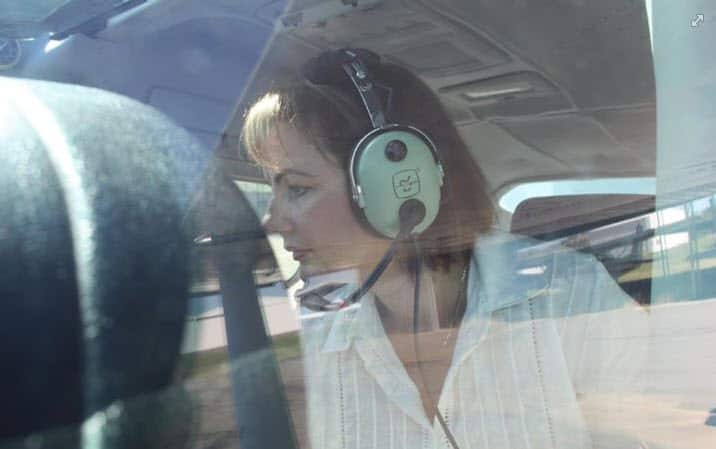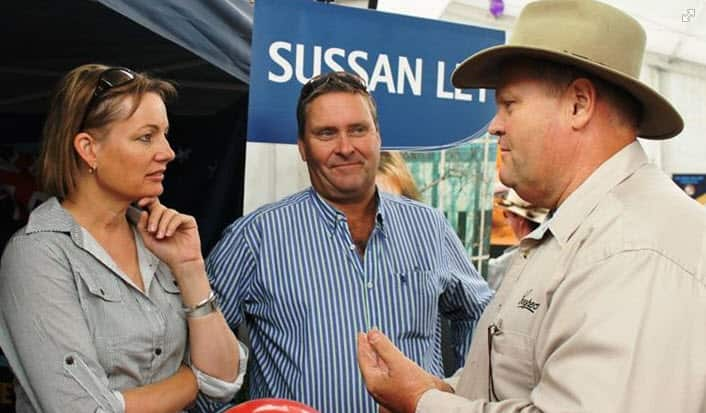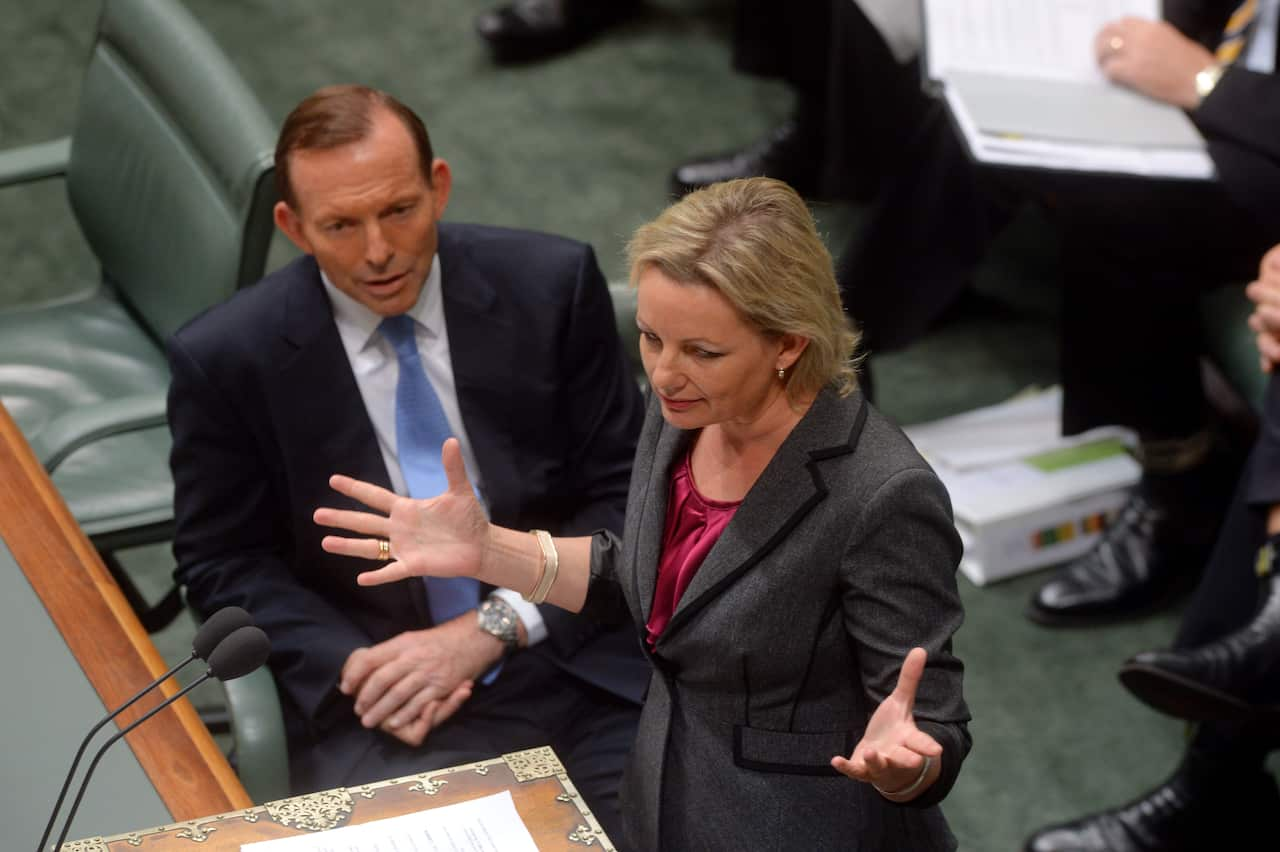- Read more in our Politicians Born Abroad series
- Eric Abetz: It’s not just Eric Abetz’s views on abortion and unemployment that have made headlines since he took a seat in the upper house
- Penny Wong: Her journey to becoming the first Asian-born member of an Australian Cabinet began in Malaysia more than three decades ago.
The minister formerly in charge of Australia’s childcare had a very unusual childhood of her own.
The Nigerian-born Sussan Ley was raised primarily in the Middle East, accompanying her father on rounds in his work for British intelligence, before migrating to Australia where she integrated herself into Canberra’s punk scene.
As the mother of three told SBS, “there was nothing in my childhood that was inside the square”.

‘My father worked for British intelligence, MI6, so to speak’
It was the Middle East where Ley – one of the two women in the Abbott Government’s cabinet - first embraced a passion for diversity.
Born in Nigeria, her English family moved to the United Arab Emirates, when she was less than two years old, for her father’s work with British intelligence.
Ley told SBS she used to join her father during fieldwork for MI6, exploring different locations along what was then called the Persian Gulf.
“I remember being fascinated with the local people, unable to speak their language but wanting very much to connect with them,” she says.
“As I would drive around the different villages with my dad - he’d sometimes load me into the car and take me on what he’d call his rounds – I would always ask questions about the people who lived in the palm shacks, what their lives were like.
“I was absolutely fascinated. They were so different from me.”
“It’s sometimes heartbreaking to see how [Gaza's] been falling apart and sometimes, when you realise you’ve visited those places and the people, to see them in those circumstances,”
She was sent to boarding school in Sussex, England, at the age of 10, an experience she described as adventurous but daunting.
“For me, I think it was a defining moment or a defining period of time and it’s tough when you don’t have family to go home to or family to rely on,” she says.
“I think in the end it was a good experience. It built great self-reliance and independence in me.”
It also nurtured her interest in politics, writing to her father about the English Liberal Party while he worked in Al-Ayn.
In addition to nurturing the future politician’s interest in government, Ley says the experience helped her develop “tools for life generally”.
“It’s helped me survive circumstances where I might feel alone,” she says.
“I’m not necessarily linking those to my time in politics… But sometimes in politics, I think people often feel a need to be liked or a need for their views to be endorsed.
“While I know that’s nice, it’s not something that’s a need in me and maybe that traces back to the time where I just simply had to rely on myself.”
‘People sometimes assume that by being a punk, you weren’t a conservative’
But it wasn’t long until her parents decided to move to Australia, a country where they had previously held jobs as a crocodile hunter, nurse and part owner of a St Kilda pub.
Ley says her parents didn’t want to retire in the Middle East and saw their former southern home as a land of great adventure and opportunity.
Making the international trip alone, she landed in Brisbane when she was 13.
“I stepped out of the aircraft – no air stairs then, so you just stepped out into the sunshine – I remember how bright it was,” she says.
“The captain came out of the cockpit – again, not the way it is now – and said to me ‘you’ve come to the best country in the world’. I still have that image in my mind, of the way he said that and the way I felt.
“It was a good feeling and I’ve never lost it.”
Her family dabbled in cattle farming before making the move to Canberra, the place that Ley came to see most as home.
It was also where she first embraced punk culture, opting for spiked purple hair, black lipstick and multiple piercings.
But Ley says the change was about more than just dog collars and razor blades.
“For me, it was about finding my identity in a world that I saw as quite beige all around me,” she says.
“It was a way of expressing yourself purely in terms of your own identity and not taking on anyone else’s views about anything. I liked that. Funnily enough, when Margaret Thatcher passed away not that long ago, I read a fascinating article about the links between British conservatism and punk rock.
“People sometimes assume that by being a punk, you weren’t a conservative, but quite clearly you could be and I was then.”
‘There was nothing in my childhood that was inside the square’
Ley says it was her childhood years in the deserts of the Middle East that made her fall in love with the Australian outback, a passion that’s led her to her north-west NSW seat of Farrer.
Though the New Zealand-sized electorate is primarily populated with people born in Australia – accounting for 94 per cent of Wilcannia residents and almost 93 per cent of those in Tibooburra – Ley says the early lesson of appreciating diversity proved essential when she entered politics in 2001.
“I think [my childhood] helped me accept a lot of differences in people and cultures, and I think it’s also helped me become less stressed than I might otherwise be about things when they’re completely outside the square,” she says.
“There was nothing in my childhood that was inside the square, let me tell you, and when I compared my childhood to the childhoods of my friends and contemporaries, I could find very little common ground.
“I think that’s just helped with the whole acceptance with diversity.”

‘I don’t want to use the expression fertility policy… but in some ways it is’
Since winning the by-election by a mere 206 votes 13 years ago, Ley has served in areas as diverse as Fisheries, Housing and Justice, but it’s her latest role as Health Minister which has garned the most attention.
She was promoted to Cabinet in the December 2014 reshuffle, joining Foreign Minister Julie Bishop as one of the two women in the Abbott Government’s inner circle.
Prime Minister Tony Abbott says he wants “more and more women in the ministry”, an aim which he hopes will be achieved in time.
Ley herself is "delighted" with the role, which she hopes to use to highlight rural and regional issues.
Her former appointment as Assistant Minister for Education also made headlines.
She’s come under fire for the Coalition’s proposed reforms to childcare and paid parental leave, which has been labelled as extravagant and inequitable.
Despite reports that the scheme may be shelved, Ley says she stands by the controversial proposal.
“I don’t want to use the expression ‘fertility policy’, because that sounds a bit odd and old fashioned, but in some ways it is,” she says.
“I’m not saying that everyone should have three children or any number of children, I’m saying that families should be able to have children, the number that they want.”
Ley says Australia’s baby replacement rate is “struggling”, concedes that Senate negotiations may see the measures watered down.
“We’ve got to accept that as things move through the Senate they do get adjusted,” she says.
“How it actually looks in practise? We’ll wait and see.”
Her upbringing in the Middle East has also driven a strong interest in events overseas, saying the developments in Gaza have been devastating for her to watch.
“It’s sometimes heartbreaking to see how it’s been falling apart and sometimes, when you realise you’ve visited those places and the people, to see them in those circumstances,” she says.
“I’ve been heartened by Foreign Minister Julie’s Bishop’s comments… We’re joining the worldwide condemnation of the violence on both sides.”
‘I want to be able to say I was happy with what I did’
Ley isn’t as certain in other areas of politics.
In the case of the same-sex marriage debate, one which her electorate feels strongly about, Ley says she has strong feelings on both sides.

She described it as a difficult question, but stressed that people who don’t support same sex marriage aren’t “bigots or extremists”.
“I won’t be bullied into making a decision one way or the other,” she says.
“Some of the people who approach me, and this goes for both sides of the arguments, tend to have a demanding, almost bullying approach.
“I’ll simply switch off.”
Ley has faced votes on similarly controversial issues previously, coming under fire for her support for stem cell research during a conscience vote in 2002.
She says the pressure is unpleasant, but you have to be willing to offend people in politics.
“I think what you have to do is take away all the small things that surround the decision, which may be as simply as offending people which you like, which sometimes can be difficult for some people to do,” she says.
“I want to be able to say I was happy with what I did. You are the one who lives with the consequences, more than anyone else. That’s the test I apply.”
Ley says she doesn’t intend to be in politics in 15 years’ time, hoping instead for an opportunity to return to her birthplace.
“I’m still fascinated with Africa, particularly Nigeria, and I’ve never been back,” she says.
“If you check the travel advisories, there’s a strong suggestion that one doesn’t go back, which is a bit sad.
“I do hope to visit one day.”
The original article was published in August 2014. It was updated in January 2015 to reflect Ley’s promotion to Cabinet.

